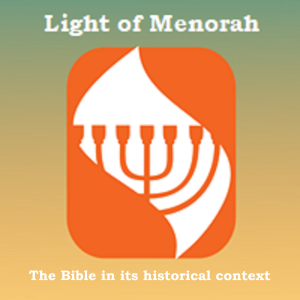
Jacob and Bet El (pronounced BATE EL) is given the same promises (check it out in Gen. 28:13-15 and 12:1-3) that were given to his grand pa Abraham but not that Jacob’s name will be famous. The covenant with Abraham and his seed (Hebrew meaning descendants) is amazing. For through Abraham and his seed all the families of all the nations will be blessed. However, in this lesson we’ll see that the Hebrew has an alternative meaning. It is bigger than we thought. Blessed is perhaps NOT the right way of using the conceptual meaning in this context.
We need to understand that there is a missing piece in how Adonai put together the Torah. Once we get this the event of Jacob’s dream and his encounter with the Lord takes us to the cross. Even the great rabbis of Judaism saw it. They saw that there is something missing in the Torah.
Consider Rabbi Akiva’s words in the Talmud.
"Rabbi Akiva says that if those subject to the punishment of karet repent, the Heavenly beit-din [court] grants them remission." (Makkot 13b)
Karet is a Hebrew word that means an offense, a sin, that is done on purpose or intentionally. It is so serious that an offense of Karet cuts one off from being a part of Israel and as per Torah, as per the very words of God, karet is never ever forgiven or cleansed. Rabbi Akiva, however, thinks the Torah is wrong. He says Karet can be forgiven is by repentance. What? The Bible never says that. The Lord never ever said that serious sins can be cleansed or forgiven by simply repenting. What we are seeing is Akiva’s opinion and not the very words of God in His Torah. We are also seeing that Akiva is implying that Yom Kippur does not take care of intentional sin. He is implying that the sin sacrifice or the sacrifice of goats or sheep or bulls is insufficient to cleanse one’s Karet done intentionally.
Maimonides’ says it another way.
The more one confesses and elaborates on this matter, the more praiseworthy he is. And, also, those under an obligation to bring sin‑offerings and trespass‑offerings, who bring their sacrifices for sins committed either in error or willfully, are not acquitted [of their sins] by means of these offerings until they repent and confess in words… (https://www.myjewishlearning.com/article/the-dimensions-of-repentance/)
In other words, sacrifice alone cannot bring acquittal; confession is a requirement and without it, repentance cannot take place. But, once again Maimonides is clearly implying that the sacrifices and rituals of Yom Kippur do not take away sins done intentionally, on purpose, with the full realization on the sinner.
The writer of the book of Hebrews also agrees. Recall …
and not through the blood of goats and calves, but through His own blood, He entered the holy place once for all, having obtained eternal redemption. (Heb 9:12)
Akiva and Maimonides and the author of Hebrews all agree. The Torah is missing something. There is no ritual, no sacrifice, no prayer that will assure us of totally forgiveness. Maimonides and Akiva’s opinion is that one must truly repent and confess. But, the the book of Hebrews and John and Paul, agreeing with these great rabbis, teaches us what the missing piece is. It is clearly explained by the disciple John as we read …
"... but if we walk in the Light as He Himself is in the Light, we have fellowship with one another, and the blood of Jesus His Son cleanses us from all sin. If we say that we have no sin, we are deceiving ourselves and the truth is not in us. If we confess our sins, He is faithful and righteous to forgive us our sins and to cleanse us from all unrighteousness." (1Jn 1:7-9)
And then we read Paul’s word that Jesus, God Himself, cleanses us by the blood.
"Be on guard for yourselves and for all the flock, among which the Holy Spirit has made you overseers, to shepherd the church of God which He purchased with His own blood.” (Act 20:28)
So, we see we must repent. We see that we must confess. But God is saying that someone must pay the price for our since. Akiva and Maimonides never addressed this. Someone must purchase us, in Hebrew redeem us, to be set free of the punishment of our Karet, our sin against the Lord done intentionally and willfully.
Rev. Ferret - who is this guy? What's his background? Why should I listen to him? Check his background at this link -
https://www.dropbox.com/s/ortnret3oxcicu4/BackgrndTeacher%20mar%2025%202020.pdf?dl=0
More Episodes
 2024-11-07
2024-11-07
 13
13
 2024-11-02
2024-11-02
 40
40
 2024-10-25
2024-10-25
 11
11
 2024-10-18
2024-10-18
 9
9
 2024-10-16
2024-10-16
 115
115
 2024-10-10
2024-10-10
 108
108
 2024-10-08
2024-10-08
 121
121
 2024-10-06
2024-10-06
 127
127
 2024-10-01
2024-10-01
 104
104
Create your
podcast in
minutes
- Full-featured podcast site
- Unlimited storage and bandwidth
- Comprehensive podcast stats
- Distribute to Apple Podcasts, Spotify, and more
- Make money with your podcast
It is Free
- Privacy Policy
- Cookie Policy
- Terms of Use
- Consent Preferences
- Copyright © 2015-2024 Podbean.com





